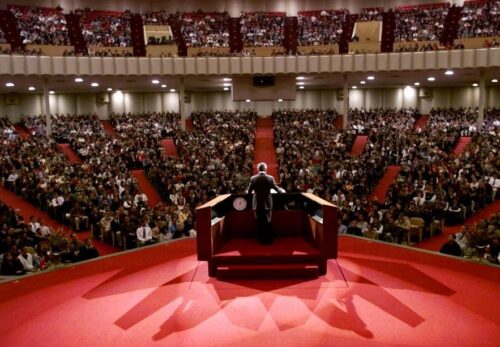Andrew Bacevich is cofounder of the Quincy Institute for Responsible Statecraft.
My mother, who would have turned 102 this month, was a genuine American patriot. During the war — the one that counted — she served as an Army nurse in the Pacific. After the war, she came home, married, raised a family, and lived a full and meaningful life.
Like millions of other members of the so-called Greatest Generation, she was not given to pondering first-order questions. Although never shy about expressing her opinions, her fundamental outlook favored the status quo: Existing arrangements, whether at home or pertaining to US policies abroad, were essentially sound and deserved popular support. I doubt that she ever entertained a radical thought.
That the actions of the federal government promoted the well-being of the nation as a whole was simply a given. Not for all Americans all the time, of course. There were imperfections that needed fixing. But on balance, what happened in Washington contributed to the well-being of ordinary citizens. Patriotism, therefore, implied supporting both nation and state.
As a youngster growing up under her watchful eye, I absorbed a similar set of beliefs. With the onset of the 1960s, of course, things became more complicated. At home, cultural upheaval erupted on an astonishing scale. Abroad, there was the stupefying debacle of Vietnam.
Through it all, my mother stood steadfast. Her faith in the essential goodness of America and in the soundness of its institutions never wavered. If she entertained second thoughts, she never voiced them.
My mother lived to see the end of the Cold War. With the passing of the “long twilight struggle,’’ the moment had seemingly arrived for her and for other patriotic citizens to claim a reward for their considerable exertions. For Americans at least, a new era of peace, prosperity, and genuine freedom was now ostensibly at hand.
Events have not dealt kindly with such expectations, to put it mildly. This, I have come to believe, is the great unanswered and largely ignored question of our time: What happened to that promise of peace, prosperity, and freedom?
The tendency in Washington — that is to say, within the federal apparatus and its universe of clients — is to dismiss that question with a hand wave. Just trust us. We have the answers. Hang in there a bit longer. Peace, prosperity, and freedom await just around the corner.
What seems increasingly apparent, however, is that ordinary people — patriotic citizens sharing my mother’s perspective — are no longer willing to take such promises at face value. This loss of faith, which has intensified over several decades, is what opens the door to charlatans, fraudsters, and demagogues.
In a nutshell, this describes the outcome of the most recent presidential election. Donald Trump depicted himself as representing the true interests of the people against the machinations of Washington. The voters who enabled him to regain the presidency endorsed that proposition. By their own lights at least, theirs was the cause of true patriotism.
Whether with malice aforethought or incidentally, President Trump has successfully severed the umbilical cord connecting nation and state, perhaps permanently. Whether the result will amount to something other than a nihilistic orgasm of looting and demolition remains to be seen. A patriotic citizen can only hope for the best.
For now, one thing alone seems certain. The conception of patriotism to which my mother adhered — rooted in the achievements of her generation — no longer carries much weight. To the extent that it survives, it does so as mere nostalgia — as obsolete as the uniform she wore when she went to war.
Patriotic Americans may well regret its passing. I certainly do. But regret cannot provide an excuse to avoid confronting this pressing question: Can a nation as sprawling and as restless as ours survive without the adhesive of core values held in common and a widely shared culture?
The years immediately ahead are likely to yield an answer to that question. But don’t expect that answer to come from Washington. In the testing time we have entered, it will fall to patriotic Americans to provide it.
